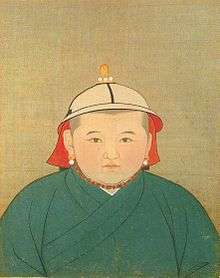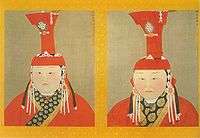Rinchinbal Khan
| Rinchinbal Emperor Ningzong of Yuan | |||||||||||||||||
|---|---|---|---|---|---|---|---|---|---|---|---|---|---|---|---|---|---|
|
14th Khagan of the Mongol Empire (Nominal due to the empire's division) 10th Emperor of the Yuan dynasty Emperor of China | |||||||||||||||||
 Portrait of Rinchinbal Khan, Emperor Ningzong of Yuan | |||||||||||||||||
| Reign | October 23, 1332 – December 14, 1332 | ||||||||||||||||
| Coronation | October 23, 1332 | ||||||||||||||||
| Predecessor | Jayaatu Khan Tugh Temür | ||||||||||||||||
| Successor | Toghon Temür | ||||||||||||||||
| Born | May 1, 1326 | ||||||||||||||||
| Died |
December 14, 1332 (aged 6) Dadu | ||||||||||||||||
| Consort | Daliyetemishi | ||||||||||||||||
| |||||||||||||||||
| House | Borjigin | ||||||||||||||||
| Dynasty | Yuan | ||||||||||||||||
| Father | Kusala | ||||||||||||||||
| Mother | Babusha of the Naiman | ||||||||||||||||
Rinchinbal (Mongolian: Rinčinbal, Ринчинбал; Rinchinbal from Tibetan rin chen dpal), also known by the temple name Ningzong (Emperor Ningzong of Yuan, Chinese: 元寧宗, May 1, 1326 – December 14, 1332), was a son of Kuśala who was briefly installed to the throne of the Yuan dynasty, but died soon after he seized the throne. He was the shortest-reigning Mongol emperor in history. Apart from Emperor of China, he is also considered as the 14th Great Khan of the Mongol Empire or Mongols, although it was only nominal due to the division of the empire.
Biography
He was the second son of Kuśala (Emperor Mingzong) and a younger brother of Toghun Temür (Emperor Huizong). He was mothered by Babusha of the Naiman tribe when his father lived in exile in Central Asia under the Chagatai Khanate.
When his father Kuśala died and was succeeded by his younger brother Tugh Temür (who is thought to have poisoned Kuśala), Rinchinbal was appointed to Prince of Fu. Tugh Temur made his son Aratnadara heir apparent in January 1331.[1] In order to secure her son's throne, Tugh Temur's Khatun Budashiri executed Rinchinbal's mother, Babusha, and exiled Toghan Temur to Korea.[2] These proved unnecessary, however, Aratnadara died one month after his designation as heir.[3]

Although Tugh Temür had a son named El Tegüs when he died in 1332, it is said that on his deathbed the Khagan expressed remorse for what he had done to his elder brother and his intention to pass the throne to Toghan Temur, Kusala's eldest son, instead of his own son. The grand councilor El Temür resisted letting Kuśala's eldest son Toghun Temür accede to the throne since he was suspected of having poisoned his father Kuśala. When Tugh Temur's widow and El Tegüs's mother Budashiri Khatun respected Tugh Temür's will of making Kuśala's son succeed the throne, the 6 year old Rinchinbal was chosen. While Toghun Temür was kept far away from the capital Dadu, Rinchinbal was in Dadu and had become favored by Tugh Temür. Rinchinbal was enthroned as the new emperor on October 23, 1332, but he died on December 14.[3]
El Temür again asked Budashiri to install El Tegüs but it was declined again. He had no choice but to invite Toghun Temür back from far-away Guangxi[4] in southwest China.
See also
References
| Rinchinbal Khan Born: 1326 Died: 1332 | ||
| Regnal titles | ||
|---|---|---|
| Preceded by Jayaatu Khan, Emperor Wenzong |
Great Khan of the Mongol Empire (Nominal due to the empire's division) 1332 |
Succeeded by Ukhaatu Khan, Emperor Huizong |
| Emperor of the Yuan dynasty 1332 | ||
| Emperor of China 1332 | ||